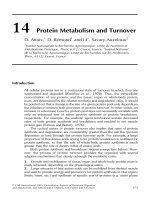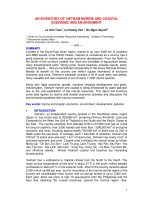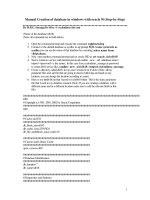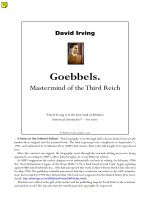Tài liệu 1992 CONSTITUTION OF THE SOCIALIST REPUBLIC OF VIETNAM (As Amended 25 December 2001) ppt
Bạn đang xem bản rút gọn của tài liệu. Xem và tải ngay bản đầy đủ của tài liệu tại đây (129.68 KB, 29 trang )
© Allens Arthur Robinson - Vietnam Laws Online Database on www.vietnamlaws.com
1
SOCIALIST REPUBLIC OF VIETNAM
Independence - Freedom - Happiness
1992 CONSTITUTION
OF THE SOCIALIST REPUBLIC OF VIETNAM
(As Amended 25 December 2001)
1
Preamble
Through the millennia of their history the Vietnamese people have worked hard and creatively and fought
valiantly to build and safeguard their country, in the course of which the nation's tradition of unity, humanity
and of staunch and indomitable struggle has been forged and its cultural heritage built and nurtured.
Since 1930, under the leadership of the Communist Party of Vietnam founded and forged by President Ho
Chi Minh, our people have undertaken a protracted and arduous revolutionary struggle that led to the
successful August Revolution and the foundation of the Democratic Republic of Vietnam on 2nd
September 1945. Over the decades that followed, our multi-ethnic nation fought continuously and, with
the precious assistance of friends across the world, especially of the socialist and neighbouring countries,
achieved glorious victories, especially in the historic Dien Bien Phu and Ho Chi Minh campaigns, defeating
the two colonialist and imperialist wars of aggression, liberating and reunifying their homeland, and
completing the people's national democratic revolution. On July 2nd, 1976 the National Assembly of
reunified Vietnam decided to change the name of the country to the Socialist Republic of Vietnam; the
whole country entered the period of transition to socialism, of resolute endeavour to build up the country,
staunch defence of the homeland as well as discharge of international obligations.
Through successive periods of war of resistance and nation-building, Vietnam has adopted the 1946
Constitution, the 1959 Constitution and the 1980 Constitution.
Since 1986 our people have carried out a process of all-round reform and renewal initiated by the Sixth
Party Congress and achieved very important initial accomplishments. The National Assembly has decided
to revise the 1980 Constitution so as to meet the exigencies of the new circumstances and tasks.
The present Constitution determines Vietnam's political economic, socio-cultural, military and security
system, the basic rights and obligations of Vietnamese citizens, the structure, organising and operating
principles of State offices; and institutionalises the inner workings of the set up wherein the people are
masters, the State provides management and the Party leadership.
In the light of Marxism-Leninism and Ho Chi Minh's thought, implementing the Political Program for
National Construction during the transitional period to socialism, the Vietnamese people pledge to bring
into full play their traditional patriotism, unite as one, uphold the spirit of self-resilience in building the
country, pursue a foreign policy of independence, sovereignty, peace, friendship and co-operation with all
countries in the world, scrupulously abide by the Constitution, and forge ahead in the cause of reform and
renewal, and of building and safeguarding their homeland.
1 As amended by Resolution 51-2001-QH10 of Legislature X of the National Assembly at its 10th Session, 25 December 2001.
© Allens Arthur Robinson - Vietnam Laws Online Database on www.vietnamlaws.com
2
CHAPTER I
THE SOCIALIST REPUBLIC OF VIETNAM
THE POLITICAL SYSTEM
Article 1
The Socialist Republic of Vietnam is an independent, sovereign and united country, which in its territorial
integrity comprises its mainland, off-shore island, airspace and territorial waters.
Article 2
The State of the Socialist Republic of Vietnam is a State of the people, by the people, for the people. All
State power belongs to the people whose foundation is the alliance between the working class and the
peasantry and the intelligentsia.
State power is unity with delegation of power to, and co-ordination among State bodies in exercising
legislative, executive and judicial rights.
Article 3
The State ensures and constantly fosters the people's rights as masters in all spheres, realises the targets
of building a prosperous life for its people, a strong country and an equitable, democratic and civilised
society, ensuring the well-being, freedom and happiness of all citizens as well as conditions for their all-
round development, and severely punishes all infringements on the interests of the nation and of the
people.
Article 4
The Communist Party of Vietnam, the vanguard of the Vietnamese working class and loyal representative
of the interests of the working class, the working people and the whole nation, who adheres to Marxism-
Leninism and Ho Chi Minh's thought, is the force assuming leadership of the State and society.
All organisations of the Party shall operate within the framework of the Constitution and the law.
Article 5
The State of the Socialist Republic of Vietnam is the united State of the various ethnic communities
cohabiting on the Vietnamese land.
The State applies a policy of equality, solidarity and mutual support among the various ethnic communities
and prohibits all acts of ethnic discrimination and division.
The various ethnic communities have the right to use their own language and writing, to preserve their
ethnic identity and to nurture their fine customs, traditions and cultures.
The State implements policies of all-round development aimed at gradually improving and raising the
material and spiritual conditions of life of ethnic minorities.
Article 6
The people exercise State power through the National Assembly and the People's Councils, bodies
representing the will and aspirations of the people and which are elected by and accountable to the
people.
The National Assembly, the People's Councils and other State bodies are organised and function
according to the principle of democratic centralism.
© Allens Arthur Robinson - Vietnam Laws Online Database on www.vietnamlaws.com
3
Article 7
Elections to the National Assembly and the People's Councils are conducted by universal equal and direct
suffrage through secret ballot.
Deputies to the National Assembly may be divested of their mandate by electors or by the National
Assembly and deputies to the People's Councils may be divested of their mandate by electors or the
People's Councils when they are no longer worthy of the people's confidence.
Article 8
All State bodies and State officials and employees shall respect the people, serve the people with utmost
dedication, maintain close ties with the people, listen to the opinions of the people and accept their
supervision. They shall resolutely combat against corruption, mis-spending and all manifestations of
bureaucratism, arrogance, and authoritarianism.
Article 9
The Vietnam Fatherland Front is the political allied organization and voluntary union of political
organizations, social-political organizations, social organizations and representative individuals of social
strata and classes, of ethnic groups, of religions and of Vietnamese people residing abroad.
The Vietnam Fatherland Front and its member organisations constitute the political base of the people's
administration. The Front fosters the tradition of national unity, strengthens political and moral cohesion
among the people, takes part in building and consolidating the people's power, and together with the
government attends to and protects the legitimate rights of the people, encourages the people to exercise
their rights as master scrupulously respect the Constitution and the law, and monitors the activities of the
state agencies, elected deputies, state officials and employees.
The State creates favourable conditions for the Fatherland Front and its member organizations to work
efficiently.
Article 10
The Vietnam Confederation of Trade Unions, as the socio-political organisation of the working class and
working people, together with State bodies and economic and social organisations cares for and protects
the interests of workers, public employees and other working people; takes part in the inspection and
supervision of the activities of State bodies and economic organisations; educates cadres, workers, public
employees and other working people in the building and defence of their homeland.
Article 11
Citizens exercise their rights as masters at the grass-roots level by taking part in state and social affairs.
They have the obligation to protect public property and legitimate rights and interests of citizens, to
preserve national security and social order and safety and the organisation of public life.
Article 12
The State administers society by rule of law and constantly strengthens the socialist legislation.
All State agencies, all economic and social organisations, the people's armed forces units and all citizens
shall strictly abide by the Constitution and the law and take part in crime prevention and in the fight against
crime and violations of the Constitution and the law.
All infringements on the interests of the State and on the lawful rights and interest of collectives and
citizens shall be sanctioned according to law.
© Allens Arthur Robinson - Vietnam Laws Online Database on www.vietnamlaws.com
4
Article 13
Our Vietnamese homeland is sacred and inviolable. All schemes and actions prejudicial to the
independence, sovereignty, unity and territorial integrity of the homeland or the cause of building and
defending the socialist homeland shall be severely punished according to law.
Article 14
The Socialist Republic of Vietnam pursues a policy of peace, friendship and expanded international
relations and cooperation with all countries in the world, irrespective of their political and social systems,
on the basis of respect for each other's independence, sovereignty and territorial integrity, non-interference
in each other's internal affairs, equality and mutual benefit; enhances the friendly solidarity and traditional
cooperation with socialist and neighbouring countries; actively supports and contributes to the common
struggle of the peoples of the world for peace, national independence, democracy and social progress.
CHAPTER II
THE ECONOMIC SYSTEM
Article 15
The State builds an independent and self-reliant economy through promoting internal strength, actively
integrating into the world’s economy and conducting industrialisation and modernisation of the country.
The State adopts consistent policies on development of a socialist-oriented market economy. The multi-
sectoral structure of the economy with diversified types of production and business organisation is based
on ownership of the entire people along with collective and private ownership, of which the first two and
the second are the cornerstone.
Article 16
The economic policies of the State are to build a strong country with prosperous life for its people, and
aimed at ever better satisfying the material and spiritual needs of the people by bringing into full play all
productive capacities, and all the potentials of the various economic sectors comprising the State,
collective, individual, small-holder, private capitalist, State capitalist and the economy with foreign owned
capital under different forms; stepping up the construction of the material and technical basis, expanding
economic, scientific and technical cooperation and exchanges with the international market.
The economic sectors constitute important components of the socialist-oriented market economy.
Individuals and organizations from different economic sectors may conduct production and business in
industries and trades permitted by law; may jointly carry out long-term development and co-operation, and
shall be equal and shall compete in accordance with the law.
The State fosters the establishment, development and step-by-step completion of all kinds of socialist-
oriented markets.
Article 17
The land, forests, rivers and lakes, water sources, underground natural resources, resources in the
territorial waters, on the continental shelf and in the air space, capital funds and properties invested by the
State in enterprises and projects in the various branches and fields of the economy, culture, social life,
science and technology, foreign affairs and national security and defence and other property defined by
law as belonging to the State fall under the ownership of the entire people.
© Allens Arthur Robinson - Vietnam Laws Online Database on www.vietnamlaws.com
5
Article 18
The State assumes the unified administration of land according to overall planning and in conformity with
the law and ensures its appropriate and effective use.
Land is allocated by the State to organisations and individuals for stable long-term use.
Organisations and individuals who use the land are duty-bound to ensure its protection, replenishment,
rational exploitation and economical utilisation. They are also entitled by law to transfer the right to use the
land allocated by the State.
Article 19
The State sector is to be strengthened and developed especially in the key branches and fields which
assume a leading role and, together with the collective economic sector, form the stable foundation of the
national economy.
Article 20
Economic collectives set up through the contribution of funds and manpower by citizens for cooperation in
production and business will be organised under different forms on the basic of voluntariness, democracy
and mutual benefit.
The State shall facilitate the consolidation and expansion of efficient economic collectives.
Article 21
Individual economic entities, small-holders and the private capitalist economic sector are allowed to
choose their forms of production and business, have the right to set up business without any limitations as
to their scale of activities in branches and trades which are beneficial to the well-being of the nation and its
people.
The development of household economy is encouraged.
Article 22
Production and business establishments is the various economic sectors have to fulfil all obligations
before the State, and are equal before the law; their legal capital and property shall be protected by the
State.
Enterprises in the various economic sectors may enter joint ventures with individuals or economic
organisations inside or outside the country as provided for by the law.
Article 23
The legal property of individual or organisations shall not be nationalised.
The State may, when necessary for reasons of security and national defence and for the national interest,
purchase or requisition with compensation at current market prices the property of individuals or of
organisations.
The procedures for purchase or requisition are defined by the law.
Article 24
The State expands external economic activities and assumes their unified administration, expands
different forms of economic relations with all countries and international organisations on the principle of
© Allens Arthur Robinson - Vietnam Laws Online Database on www.vietnamlaws.com
6
respect for independence, sovereignty and mutual benefit, and of appropriate protection for domestic
production.
Article 25
The State encourages foreign organisations and individuals to invest capital and technology in Vietnam in
accordance with Vietnamese law and with international law and practice; ensures the legal ownership of
capital and assets as well as other interests of foreign organisations and individuals. Enterprises with
foreign invested capital shall not be nationalised.
The State encourages and creates favourable conditions for the Vietnamese who live abroad to invest in
the homeland.
Article 26
The State assumes the unified administration of the national economy through legislation, plans, policies,
assigns responsibilities and devolves State administrative authority among the various levels, combines
the interests of individuals, collectives and the State.
Article 27
All economic and social activities and State administration as a whole have to observe economy.
Article 28
All illegal production or business activities, all acts that undermine the national economy, harm the
legitimate interests of the State, collectives and citizens shall be strictly punished in accordance with the
law.
The State adopts policies aimed at protecting the interests of producers and consumers.
Article 29
All State offices, armed forces units, economic establishments, social organisations and every citizen have
to observe State regulations on the appropriate utilisation of natural resources and on environmental
protection.
All acts resulting in depletion and destruction of the environment are strictly prohibited.
CHAPTER III
CULTURE, EDUCATION, SCIENCE AND TECHNOLOGY
Article 30
The State and society preserve and develop a progressive Vietnamese culture imbued with national
identity; and inherit and enhance the values of the multi-ethnic Vietnamese civilisation, Ho Chi Minh's
thought, ethics and style; assimilate the quintessence of human culture; and foster all the creative talents
of the people.
The State assumes the unified administration of cultural development. Reactionary and depraved
ideologies and culture are to be banned; superstition is to be driven out.
Article 31
The State creates favourable conditions for citizens' all-round development; inculcates in citizens the
sense if civic responsibility and the need to live and work in accordance with the Constitution and the law,
© Allens Arthur Robinson - Vietnam Laws Online Database on www.vietnamlaws.com
7
to preserve fine customs and to build happy and cultured families; instils in citizens patriotism, attachment
to the socialist regime and a genuine spirit of internationalism, friendship and cooperation among nations
in the world.
Article 32
Art and literature help nurture the noble personality and soul of the Vietnamese people.
The State invest in the development of culture, literature and art, creates favourable conditions for the
people to enjoy literary and artistic works of high value; sponsors the promotion of creative literary and
artistic talents.
The state develops diverse forms of literary and artistic activities; encourages popular literary and artistic
activities.
Article 33
Work in the field of information, press, radio, television, cinema, publishing, libraries and other means of
mass communication is to be developed by the State-Cultural of information activities detrimental to the
national interests and which undermine the fine personality, morality and way of life of the Vietnamese
people are prohibited.
Article 34
The State and society preserve and develop the national cultural heritage; historical or revolutionary
monuments, cultural relics, works of art and beauty-spots shall be maintained, restored, protected and
their impact fostered. Due attention shall also be granted to preservation and museum work.
All acts causing damage to or prejudicial to historical or revolutionary monuments, works of art and beauty-
spots are strictly prohibited.
Article 35
Education development is a primary national policy.
The State and society develops education with a view to raising the people's intellectual standard, training
human resources, fostering talent.
Education's objective is to foster and nurture the personality, human qualities and capability of the citizen,
to train a body of skilled dynamic and innovative workers imbued with national pride and good virtues and
the resolve to strive to build a strong and prosperous nation, so as to meet the needs of nation-building
and defence.
Article 36
The State assumes the unified administration of the national education system in terms of objectives,
curricula, subject matter, planning, teachers' criteria, examination regulations and diploma system.
The State shall ensure the balanced development of the education system comprising the pre-school
education, general education, vocational education, university and post graduate education,
universalisation of secondary education; the development of various types of schools, state-run, private
and other.
The State gives priority to investment in education and encourages other sources of investment therein.
The State carries out a policy of priority for development of education in the mountainous regions, ethnic
minority areas and specially difficult areas.
© Allens Arthur Robinson - Vietnam Laws Online Database on www.vietnamlaws.com
8
Together with the school, mass organisations, being first and foremost the Ho Chi Minh Communist Youth
Union, social and economic organisations, and the family have the responsibility to educate youth and
children.
Article 37
Scientific and technological development is a primary national policy.
Science and technology play a key role in the socio-economic development of the country.
The State is to work out and implement a national policy on science and technology; build an advanced
science and technology; ensure the harmonious development of the various kinds of science, study and
receive world scientific and technological achievements so as to build up a scientific rationale for policy-
and law-making, renew our technologies, develop the productive forces, upgrade our management ability,
ensure the quality and pace of development of the economy and thus contribute to ensure national
security and defence.
Article 38
The State is to invest into and encourage funding of science from various sources with priority in the
direction of leading edge sciences and technologies attend to the training and rational employment of the
body of scientists and technicians, especially those with an advanced level, and of skilled workers and
craftsmen; create favourable conditions for the creative contribution of scientists, promote many forms of
organisation and conduct of scientific research; link scientific research to socio-economic development
needs, closely associate scientific research and training with production and business.
Article 39
The State invests in, develops and ensures the unified administration of people's health protection,
harnesses and organises all social forces to build and develop a prevention-oriented Vietnamese
medicine; combines disease prevention with treatment; develops and combines modern with traditional
medicine and pharmacology; combines the development of public along with popular health care; ensures
health care insurance and creates favourable conditions for all people to enjoy health care.
The State grants priority to the implementation of the health care program for mountain inhabitants and
ethnic minority people.
Illegal medical treatment production and sale of medicines detrimental to the people's health by
organisations of individuals are prohibited.
Article 40
The State, society, the family and all citizens have the obligation to give protection and care to mothers
and children and to implement the population and family planning programme.
Article 41
The State and society are to develop physical culture and sports in Vietnam with a national, scientific and
popular character.
The State assumes the unified management of sports and physical culture promotion; determines
requirements for compulsory physical education at schools; encourages and assists in the development of
various forms of popular voluntary physical culture and sports, creates necessary conditions to constantly
expand broad-based popular physical and sports activities; attach special importance to professional
physical and sports activities, train and foster sport talents.
© Allens Arthur Robinson - Vietnam Laws Online Database on www.vietnamlaws.com
9
Article 42
The State and society are to develop tourism, tourist activities inside and outside the country are to be
encouraged and broadened.
Article 43
The State expands international exchanges and cooperation in the fields of culture, information, literature,
art, science, technology, education, health care, physical culture and sports.
CHAPTER IV
DEFENCE OF THE VIETNAMESE SOCIALIST HOMELAND
Article 44
The defence of the Vietnamese Socialist Homeland and the maintenance of national security is a cause of
the entire people.
The State consolidates and strengthens the system of defence by the entire people and of people's
security, the core role being played by the people's armed forces; brings into play the combined strength of
the nation to firmly safeguard the homeland.
State offices, economic or social organisations and all citizens are duty-bound to discharge their obligation
with respect to defence and security as provided by the law.
Article 45
The People's armed forces owe absolute loyalty to the Homeland and the people, have the duty to be
prepared to defend the independence, sovereignty, unity and territorial integrity of the homeland, national
security and social order and safety, to defend the socialist regime and the gains of the revolution, and to
join the entire people in building the country.
Article 46
The State builds up a regular, combat-trained and gradually modernised people's revolutionary army,
reserve forces and powerful local militia forces on the basic of the combination of construction with
defence, of the strength of the people's armed forces with that of the entire people and of the strength of
the tradition of national unity against foreign aggression with that of the socialist regime.
Article 47
The State is to build up regular, well trained gradually modernised people's revolutionary security forces
relying on the people and serving as a core for the people's movement to defend national security and
social order and safety, ensure political stability and citizen's rights to freedom and democracy, protect
people's lives and property and the socialist property, prevent and fight against the various kinds of crimes.
Article 48
The State fosters the people's patriotism and revolutionary heroism, ensures people's education in
defence and security, enforces compulsory military service, and an appropriate policy with regard to
soldiers' families, builds up the defence industry, provides equipment to armed forces, combines national
defence with economic development and vice-versa, ensures the material and moral conditions of life of
officers and soldiers, defence workers and employees, builds powerful people's armed forces and
constantly strengthens the ability to defend the country.
CHAPTER V
© Allens Arthur Robinson - Vietnam Laws Online Database on www.vietnamlaws.com
10
BASIC RIGHTS AND OBLIGATIONS OF CITIZENS
Article 49
Citizens of the Socialist Republic of Vietnam are persons enjoying Vietnamese citizenship.
Article 50
In the Socialist Republic of Vietnam, human rights in all respects, political, civic, economic, cultural and
social are respected, find their expression in the rights of citizens and are provided for by the Constitution
and the law.
Article 51
The rights of citizens are inseparable from their obligations.
The State guarantees the rights of citizens and citizens must fulfil their obligations towards the State and
society.
Rights and obligations of citizens are provided for by the Constitution and the law.
Article 52
All citizens are equal before the law.
Article 53
Citizens have the right to take part in managing the State and society, in debating on general issues of the
whole country or of the locality, and make petitions or recommendation to the state offices and vote at any
referendum held by the State.
Article 54
All citizens regardless of their ethnic origin, sex, social status, belief, religion, educational level, occupation
and term of residence have the right to vote upon reaching the age of eighteen and stand for election to
the National Assembly and the People's Councils upon attaining the age of twenty one as provided by law.
Article 55
Work is the right, obligation of citizens. The State and society are to draw up plans to create an increasing
number of jobs for the workers.
Article 56
The State is to promulgate labour protection policies and provisions.
The State determines the work time and provisions regarding salary, rest and social insurance for public
employees and other salary-earners; encourages other forms of social insurance for the workers.
Article 57
Citizens have the right to freely do business in accordance with the law.
© Allens Arthur Robinson - Vietnam Laws Online Database on www.vietnamlaws.com
11
Article 58
Citizens have the right to ownership of lawful income, savings, housing, personal possessions, means of
production, capital and other assets in enterprises or in other economic organisations; the right to use the
land allocated by the State is provided for in Article 17 and 18.
The State protects the citizen's right to bequeath and to inherit.
Article 59
Education is a right and obligation of citizens.
Primary education is to be compulsory and free of charge.
Citizens have the right to general and vocational education in various forms.
The State and society encourage gifted pupils and students in their studies with the view to develop their
talents.
The State is to adopt policies on tuition fees and scholarships.
The State and society are to provide conditions for handicapped and other specially disadvantaged
children to enjoy appropriate general and vocational education.
Article 60
Citizens have the right to undertake scientific and technical research and discovery, invention, innovations,
technical improvements, rationalisation of production, and to engage in literary, artistic creation and
criticism and other cultural activities. Copy right and the right to industrial ownership protected by the
State.
Article 61
Citizens are entitled to health care.
The State determines provisions on hospital fees as well as exemption from or reduction of hospital fees.
Citizens have the obligation to comply with regulations on disease prevention and public hygiene.
Illegal production, transportation, sale, stockpiling and use of opium and other narcotic drugs are strictly
prohibited. The State provides for compulsory treatment of drug addiction and certain dangerous social
diseases.
Article 62
Citizens have the right to undertake construction of housing in accordance with planning and law.
Interests of tenants and landlords are protected by the law.
Article 63
All citizens regardless of their sex have equal rights in all respects, political, economic, cultural, social and
in family life.
Any discrimination against women and violation of women's dignity are strictly prohibited.









